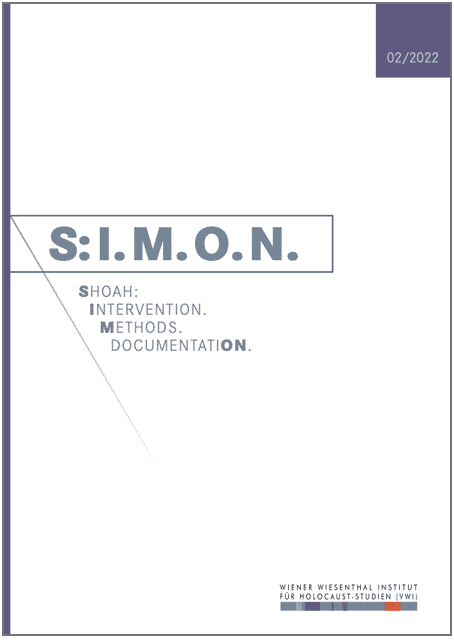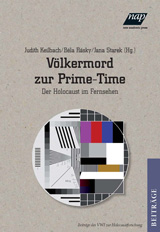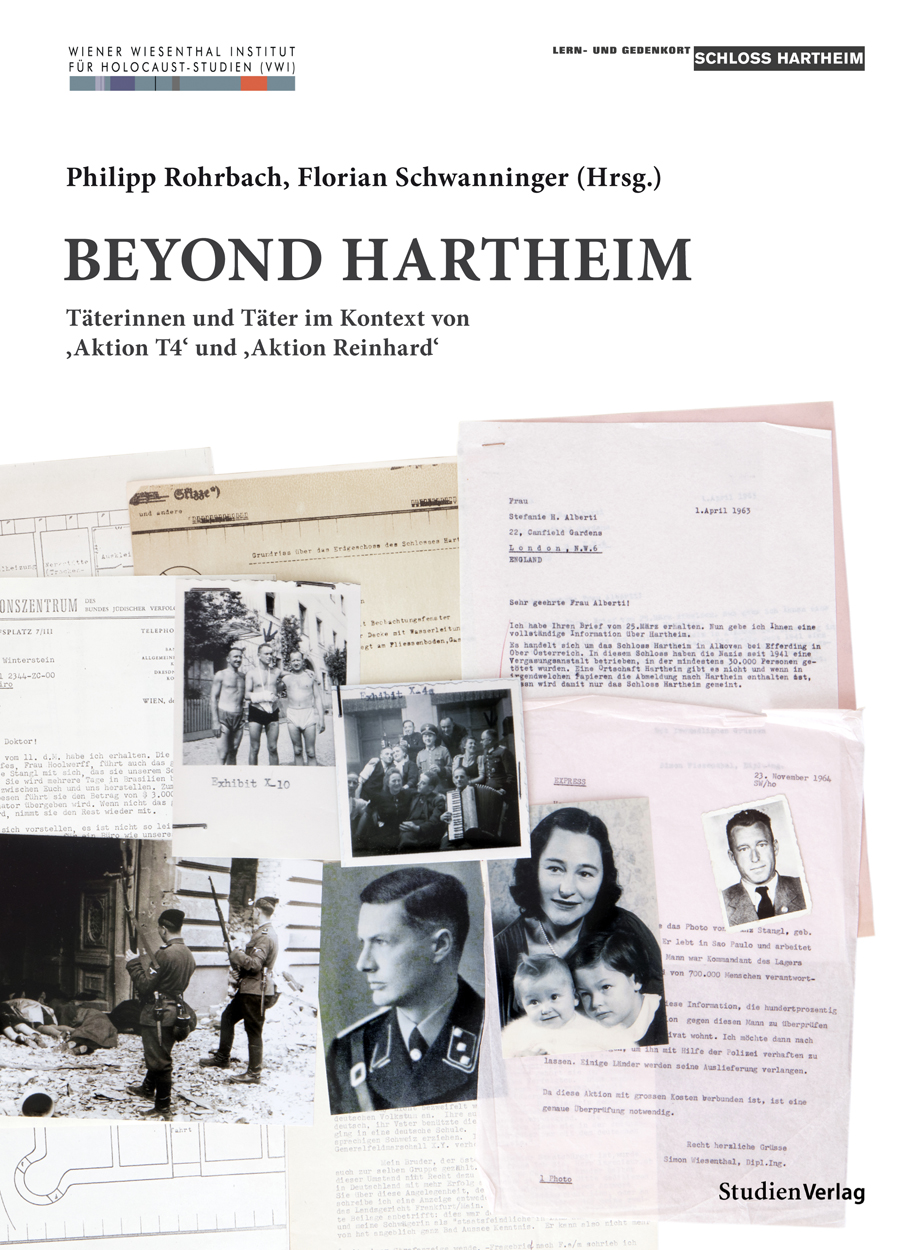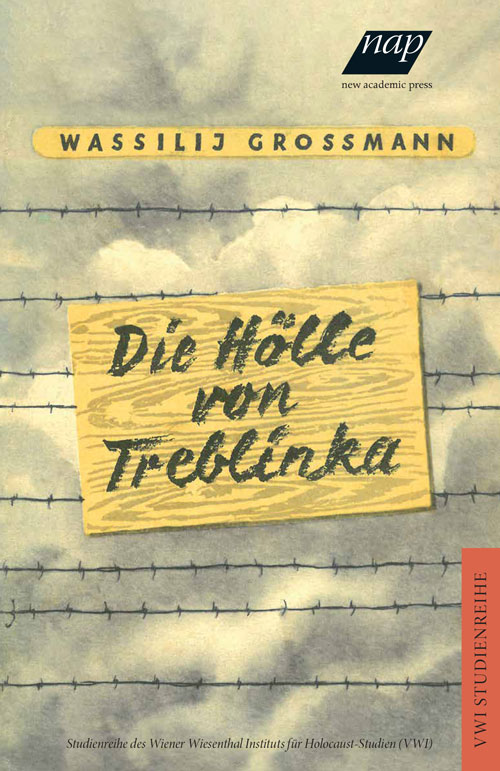News – Events – Calls
| 24. April 2024 19:00 BuchpräsentationIngeborg Bachmann, Marie Luise Kaschnitz, Hilde Domin, Nelly Sachs: Über Grenzen sprechend. Briefe. Piper/Suhrkamp, München, Berlin, Zürich 2023Ingeborg Bachmann stand mit zentralen Protagonistinnen der deutschsprachigen Literatur im Austausch, nun werden ihre Briefwechsel mit Marie Luise Kaschnitz, Hilde Domin und Nelly Sachs erstmals zugänglich gemacht. Die Briefe geben Einblick in die Lebensbedingungen, das literarische S...Weiterlesen... |
| 02. May 2024 18:30 Simon Wiesenthal LectureEdyta Gawron: Never Too Late to Remember, Never Too Late for Justice! Holocaust Research and Commemoration in Contemporary PolandIn 1994, Simon Wiesenthal received a doctorate honoris causa from the Jagiellonian University in Krakow for his lifelong quest for justice – half a century after he had been, for a short time, prisoner of the local Nazi Concentration Camp (KL) Plaszow. The 1990s were the decade when t...Weiterlesen... |
| 07. May 2024 00:00 - 04. June 2024 00:00 WorkshopDealing with Antisemitism in the Past and Present. Scientific Organisations and the State of Research in AustriaThis series of talks, presented by antisemitism experts from different organisations that research antisemitism using a variety of academic approaches, aims to provide a snapshot of historical evolutions, current events, prevalent perceptions and declared (and undeclared) attitudes. I...Weiterlesen... |
| 14. May 2024 08:45 - 16. May 2024 16:30 TagungQuantifying the Holocaust. Classifying, Counting, Modeling: What Contribution to Holocaust History? About the conference: https://quantiholocaust.sciencesconf.org/ Programme timed on the basis of 15-minute presentations + 15-minute discussions; short breaks and lunches Day 1 Tuesday, 14 May 2024Centre Malher (9 rue Malher 75004 Paris/amphi Dupuis) From 8.45 am: Welcome9.30 am...Weiterlesen... |
| 24. May 2024 18:00 InterventionLange Nacht der Forschung 20242024 öffnet das Wiener Wiesenthal Institut für Holocaust-Studien (VWI) in der Langen Nacht der Forschung wieder seine Tore und lädt Interessierte in seine Räumlichkeiten am Rabensteig 3 ein. Im Rahmen von Vorträgen, Podiumsdiskussionen und Präsentationen bieten VWI-Team und Gäste Einb...Weiterlesen... |
Rasa Baločkaitė
Research Fellow (10/2019–03/2020)
Coping with Trauma among Descendants of Holocaust Perpetrators in Lithuania
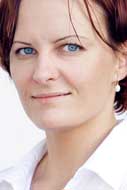 While the Holocaust is articulated in Lithuania mostly at the political or historical levels, with a focus on historical details, political circumstances, public commemorations etc., this project aims to illuminate the psychological dimensions, namely how descendants of Holocaust perpetrators deal with their parents’ and grandparents’ pasts. The research was inspired by German literature on Nazi children (Jennifer Teege and Niklas Frank) and supported by Hannah Arendt’s idea that evil affects both sides equally, the victim and the perpetrator, and that trauma effects are transferred from one generation to another. The research is based on two books, Musiskiai (Our People, 2016) by Rūta Vanagaite and Mes nežudėme (We Did Not Kill, 2017) by Arkadijus Vinokuras, both consisting of conversations with the descendants of Holocaust perpetrators. The research explores emotional and psychological responses to the traumatising past, strategies of coping such as active forgetting, anger, denial, and rationalisation, the linguistic and narrative framing of the trauma, and the link between personal and collective or official narratives.
While the Holocaust is articulated in Lithuania mostly at the political or historical levels, with a focus on historical details, political circumstances, public commemorations etc., this project aims to illuminate the psychological dimensions, namely how descendants of Holocaust perpetrators deal with their parents’ and grandparents’ pasts. The research was inspired by German literature on Nazi children (Jennifer Teege and Niklas Frank) and supported by Hannah Arendt’s idea that evil affects both sides equally, the victim and the perpetrator, and that trauma effects are transferred from one generation to another. The research is based on two books, Musiskiai (Our People, 2016) by Rūta Vanagaite and Mes nežudėme (We Did Not Kill, 2017) by Arkadijus Vinokuras, both consisting of conversations with the descendants of Holocaust perpetrators. The research explores emotional and psychological responses to the traumatising past, strategies of coping such as active forgetting, anger, denial, and rationalisation, the linguistic and narrative framing of the trauma, and the link between personal and collective or official narratives.
Rasa Baločkaitė Baločkaitė is Associate Professor of Sociology at Vytautas Magnus University, Lithuania. Her scholarly interests include Soviet and post-Soviet studies. She was a Fulbright scholar at UC Berkeley in 2011 and a visiting fellow at the Centre for Contemporary History in Potsdam in 2013. Rasa Baločkaitė has published in leading journals such as Problems of Post Communism, Language Policy, and European History Quarterly. She has also written extensively on traumatic and post-traumatic experiences for Lithuanian media.
E-Mail: This email address is being protected from spambots. You need JavaScript enabled to view it.
Roland Clark
Research Fellow (10/2019-01/2020)
Schools of Hate. Antisemitic Student Organisations in 1920s Austria
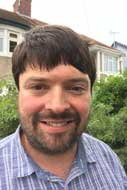 This project examines a wave of antisemitic riots that swept through universities in eleven European countries during the early 1920s. Between 1919 and 1923, antisemites violently campaigned for student control of the universities, attacked Jews, and supported extremist right-wing parties. I situate these riots within structural changes that took place in European universities after the First World War, analysing how the relatively sudden nationalisation and democratisation of universities charged everyday practices of teaching and learning with ethnic and political meanings. As sites of cultural reproduction, universities became hotly contested spaces where young people tried to impose their agendas on politicians and other elites.
This project examines a wave of antisemitic riots that swept through universities in eleven European countries during the early 1920s. Between 1919 and 1923, antisemites violently campaigned for student control of the universities, attacked Jews, and supported extremist right-wing parties. I situate these riots within structural changes that took place in European universities after the First World War, analysing how the relatively sudden nationalisation and democratisation of universities charged everyday practices of teaching and learning with ethnic and political meanings. As sites of cultural reproduction, universities became hotly contested spaces where young people tried to impose their agendas on politicians and other elites.
I approach individual movements as local expressions of a transnational cycle of protest. Focussing on grievances, repertoires, political alliances, opportunity structures, and transnational flows allows me to reconstruct the entire cycle of protest in a coherent manner without minimising the importance of local contexts.
Roland Clark is a Senior Lecturer in History at the University of Liverpool. His research and teaching focus on the cultural history of modern East-Central Europe, with a particular interest in fascism, social movements, violence, gender, theology, and lived religion. His first book, Holy Legionary Youth. Fascist Activism in Interwar Romania (Ithaca 2015) approaches Romanian fascism by asking what activism meant to young Romanian men and women.
E-Mail: This email address is being protected from spambots. You need JavaScript enabled to view it.
György Majtényi
Research Fellow (10/2019–02/2020)
Transnational Memory of the Roma Holocaust/Porrajmos
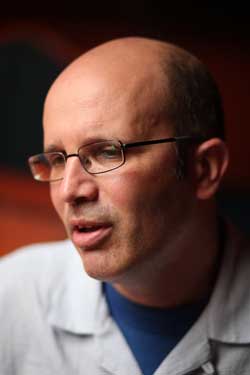 Roma history can be illustrated both within the context of the history of a given country/nation states and – breaking somewhat with these national histories – in the context of a unified Roma history. This latter approach might be called a “transnational” depiction of Roma history. Recent decades have seen the publication of several Roma history books that describe the history of Roma communities from ethnogenesis to the present in the framework of a unified narrative in a “transnationalised” space, partly independent from the histories of nation states. Discussions of and engagements with collective traumas might also have played a role in the construction of a unified Roma history and in the strengthening of a Roma national/ethnic identity. This research examines the stages and actors in the process through which the Roma Holocaust/Porrajmos became a ‘site of memory’ within Roma minority communities living in different nation states, and later the function of this ‘site of memory’ in the making of a unified, common narrative of Roma history and in the transnational process of Roma national identity building.
Roma history can be illustrated both within the context of the history of a given country/nation states and – breaking somewhat with these national histories – in the context of a unified Roma history. This latter approach might be called a “transnational” depiction of Roma history. Recent decades have seen the publication of several Roma history books that describe the history of Roma communities from ethnogenesis to the present in the framework of a unified narrative in a “transnationalised” space, partly independent from the histories of nation states. Discussions of and engagements with collective traumas might also have played a role in the construction of a unified Roma history and in the strengthening of a Roma national/ethnic identity. This research examines the stages and actors in the process through which the Roma Holocaust/Porrajmos became a ‘site of memory’ within Roma minority communities living in different nation states, and later the function of this ‘site of memory’ in the making of a unified, common narrative of Roma history and in the transnational process of Roma national identity building.
György Majtényi is a social historian and professor at Károly Eszterházy University. Between 2000 and 2011, he was department head of the National Archives of Hungary. He received his PhD in 2004 from the Eötvös Loránd University with a thesis on social mobility in post-1945 Hungary and his habilitation in 2010. His recent research interests include Roma social history, the history of East-Central Europe in the twentieth century, intellectual history, and historiography.
E-Mail: This email address is being protected from spambots. You need JavaScript enabled to view it.
Katarzyna Person
Research Fellow (03/2020–07/2020)
The Search for Retribution as a Community Building Process Among Jews and Poles in the Postwar World. National and Transnational Aspects.
 This project discusses the cross-border aspect of the individual search for retribution for crimes committed during the Second World War in East-Central Europe. It focusses specifically on the immediate postwar response of Jewish prewar Polish citizens to individual wartime norm-violating behaviour, showing how people moved just before the Iron Curtain came down, how they dealt with their memories, and how they would go on to build new communities abroad. It thus focusses on individual agency in seeking revenge, taking into consideration gender, age, social status, and geographic location as key aspects in shaping this search.
This project discusses the cross-border aspect of the individual search for retribution for crimes committed during the Second World War in East-Central Europe. It focusses specifically on the immediate postwar response of Jewish prewar Polish citizens to individual wartime norm-violating behaviour, showing how people moved just before the Iron Curtain came down, how they dealt with their memories, and how they would go on to build new communities abroad. It thus focusses on individual agency in seeking revenge, taking into consideration gender, age, social status, and geographic location as key aspects in shaping this search.
Katarzyna Person is an assistant professor at the Jewish Historical Institute in Warsaw specialising in Eastern European Jewish History. She has published over 20 peer-reviewed articles and three books dealing with the Holocaust and its aftermath in occupied Poland.
E-Mail: This email address is being protected from spambots. You need JavaScript enabled to view it.
Andrew Wisely
Research Fellow (02/2020–06/2020)
Between Auschwitz and Frankfurt. The Deception and Exception of SS Doctor Franz Lucas (1911–1994)
 This project examines Dr. Franz Bernhard Lucas (1911–1994), an SS camp and troop doctor who served for sixteen months in Auschwitz-Birkenau, Mauthausen, Stutthof, Ravensbrück, and Sachsenhausen. In the Frankfurt Auschwitz Trial (1963–1965) he denied having selected Jews on the Birkenau ramp in 1944, then admitted to doing so under pressure. His putative fear and the glowing testimony of Ravensbrück survivors mitigated his punishment and secured his acquittal in 1970. The trial anchors my book without dominating it. A more comprehensive portrait of Lucas requires university records, interrogations, other trial transcripts, testimonies, letters, officer files, and camp records. These help us understand his formation in the ‘Volksgemeinschaft’ and his eugenic actions against its racial outsiders. My book conceives of Lucas as a Januskopf – looking forward and backward, at once reluctant and opportunistic. Examples of deception offset reports of Lucas’s exceptionalism and entanglement. I also illuminate the culture of amnesty and victimisation in the 1950s and 1960s that delayed the acceptance of responsibility and remorse toward the true victims.
This project examines Dr. Franz Bernhard Lucas (1911–1994), an SS camp and troop doctor who served for sixteen months in Auschwitz-Birkenau, Mauthausen, Stutthof, Ravensbrück, and Sachsenhausen. In the Frankfurt Auschwitz Trial (1963–1965) he denied having selected Jews on the Birkenau ramp in 1944, then admitted to doing so under pressure. His putative fear and the glowing testimony of Ravensbrück survivors mitigated his punishment and secured his acquittal in 1970. The trial anchors my book without dominating it. A more comprehensive portrait of Lucas requires university records, interrogations, other trial transcripts, testimonies, letters, officer files, and camp records. These help us understand his formation in the ‘Volksgemeinschaft’ and his eugenic actions against its racial outsiders. My book conceives of Lucas as a Januskopf – looking forward and backward, at once reluctant and opportunistic. Examples of deception offset reports of Lucas’s exceptionalism and entanglement. I also illuminate the culture of amnesty and victimisation in the 1950s and 1960s that delayed the acceptance of responsibility and remorse toward the true victims.
Andrew Wisely is Associate Professor of German at Baylor University, where he teaches all levels of German and co-directs a study abroad programme in Dresden. He is the author of Arthur Schnitzler and Twentieth-Century Criticism (2004). He has published articles on sterilisation, trauma, and confessional modes. His research and teaching interests include Austrian literature, medical literary discourses and ethics, testimony, postwar justice, perpetrator rhetoric, and trauma.
E-Mail: This email address is being protected from spambots. You need JavaScript enabled to view it.
Miloslav Szabó
Research Fellow (10/2013 – 08/2014)
Der Antisemitismus in der Slowakei in den 1920er- und 1930er-Jahren
 Das Forschungsprojekt beschäftigt sich zum ersten Mal systematisch mit der Geschichte des Antisemitismus in der Slowakei zur Zeit der Ersten Tschechoslowakischen Republik. Es soll zeigen, dass hier der Antisemitismus bis 1938 zwar keine institutionalisierte Gestalt annahm, als semantisches Konstrukt und Gegenstand der politischen und sozialen Praxis aber dennoch eine beträchtliche Wirkungskraft ausüben konnte. Es geht nicht zuletzt um die Klärung des Problems, inwiefern die antisemitische Radikalisierung im Herbst 1938 auf außen- oder innenpolitische Faktoren zurückzuführen ist. Darüber hinaus sollen die Kontinuitäten zwischen dem Antisemitismus vor und nach 1938 herausgearbeitet werden. Das Forschungsprojekt will zur Erklärung des Holocaust in der Slowakei – das heißt der planmäßigen Entrechtung der jüdischen Bevölkerung, des Raubs von jüdischem Eigentum und der Auslieferung eines großen Teils der jüdischen Bürger an NS-Deutschland – beitragen, indem es zeigt, inwiefern die propagandistische Beschwörung der „Judenfrage" durch das autoritäre Regime bzw. die Suche nach ihrer „Lösung" die slowakische Politik bereits in den 1920er und 1930er Jahren geprägt hat.
Das Forschungsprojekt beschäftigt sich zum ersten Mal systematisch mit der Geschichte des Antisemitismus in der Slowakei zur Zeit der Ersten Tschechoslowakischen Republik. Es soll zeigen, dass hier der Antisemitismus bis 1938 zwar keine institutionalisierte Gestalt annahm, als semantisches Konstrukt und Gegenstand der politischen und sozialen Praxis aber dennoch eine beträchtliche Wirkungskraft ausüben konnte. Es geht nicht zuletzt um die Klärung des Problems, inwiefern die antisemitische Radikalisierung im Herbst 1938 auf außen- oder innenpolitische Faktoren zurückzuführen ist. Darüber hinaus sollen die Kontinuitäten zwischen dem Antisemitismus vor und nach 1938 herausgearbeitet werden. Das Forschungsprojekt will zur Erklärung des Holocaust in der Slowakei – das heißt der planmäßigen Entrechtung der jüdischen Bevölkerung, des Raubs von jüdischem Eigentum und der Auslieferung eines großen Teils der jüdischen Bürger an NS-Deutschland – beitragen, indem es zeigt, inwiefern die propagandistische Beschwörung der „Judenfrage" durch das autoritäre Regime bzw. die Suche nach ihrer „Lösung" die slowakische Politik bereits in den 1920er und 1930er Jahren geprägt hat.
Miloslav Szabó, Historiker, Doktorat an der Karls-Universität in Prag mit einer Arbeit über Alfred Rosenberg (2004). Seit 2007 beschäftigt er sich mit der Geschichte des slowakischen Antisemitismus im Rahmen des Forschungskollegs „Antisemitismus in Europa, 1879-1914" am Zentrum für Antisemitismusforschung der Technischen Universität in Berlin, Stipendiat der Gerda Henkel Stiftung und der Deutschen Forschungsgemeinschaft. Seit 2011 Mitarbeiter am Forschungsprojekt am Jüdischen Museum in Prag.






